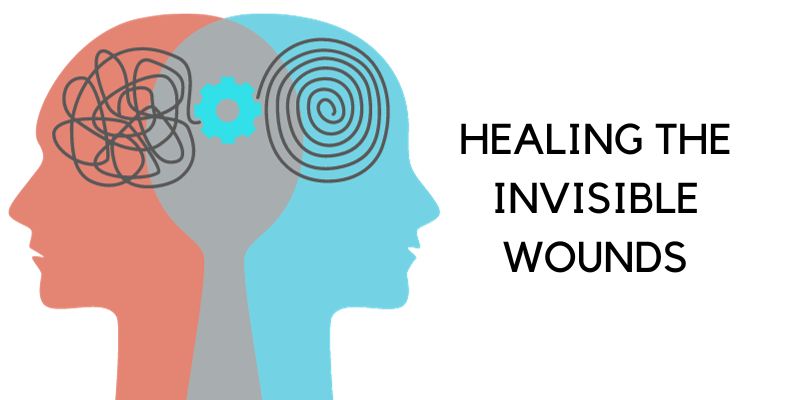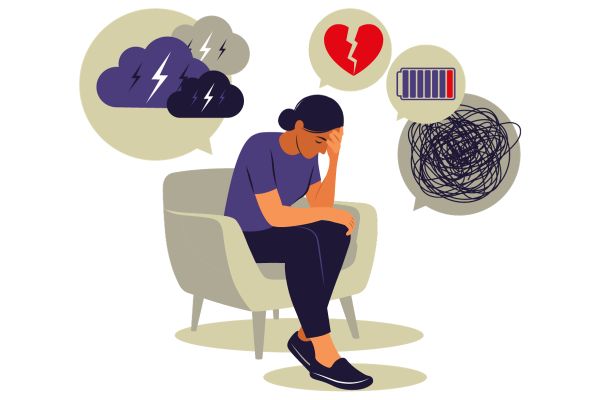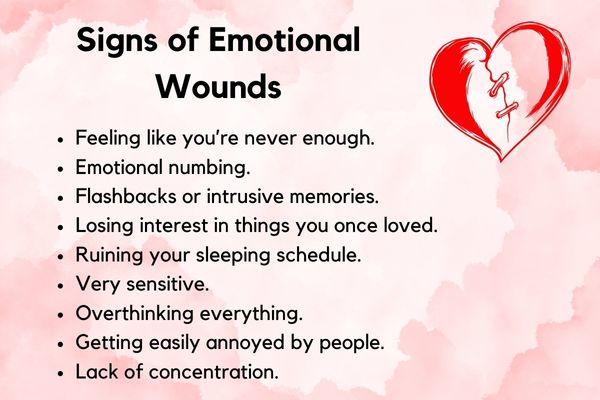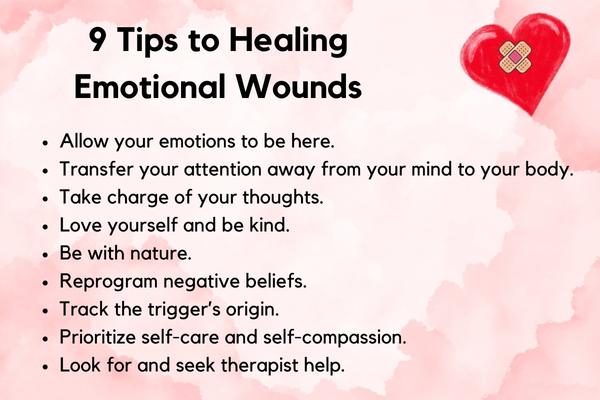Take all the time you need to heal emotionally. Heal at your own pace. Step by step. Day by day. – Karen Salmansohn
In a world that often focuses on physical injuries, it is crucial to shed light on the invisible wounds that plague countless individuals: emotional scars. These wounds, inflicted by traumatic experiences, can leave lasting imprints on a person’s mental and emotional well-being. However, healing is possible, and understanding the complexities of these scars is the first step towards overcoming them. In this article, we delve into the depths of emotional scars, exploring their origins, manifestations, and impact on one’s life. We also uncover effective strategies and techniques for healing these wounds, helping individuals regain their emotional equilibrium and find solace in their journey towards recovery. Whether you are personally grappling with emotional scars or seeking to support someone in their healing process, this article aims to provide invaluable insights and practical guidance. Join us on this transformative journey as we navigate the path to healing the invisible wounds and reclaiming our emotional well-being.
Types of Emotional Scars
Emotional scars can take many forms, each with its own distinct characteristics and effects on an individual’s life.
One common type is Trauma-induced scars, which result from experiences such as physical or emotional abuse, accidents, natural disasters, or witnessing violence. Scars can take the form of mental health conditions such as stress, anxiety, depression, post-traumatic stress disorder (PTSD), or other related issues.
Another type is Relationship scars, which stem from toxic relationships, betrayal, or abandonment. These scars often affect one’s ability to trust and form healthy connections with others.
Additionally, Self-Esteem scars result from experiences that undermine an individual’s self-worth, such as bullying, body shaming, or constant criticism. These scars can lead to feelings of inadequacy, low self-esteem, and even self-destructive behaviours.
Finally, Childhood scars are imprints left from traumatic experiences during childhood, such as emotional neglect, abuse, or witnessing domestic violence. These scars can significantly impact an individual’s development, relationships, and overall well-being.
Understanding the different types of emotional scars is crucial for both individuals and their support systems, as it allows for tailored approaches to healing and recovery. By recognising the specific type of emotional scar, one is dealing with, individuals can better navigate their healing journey and seek appropriate professional help, if necessary.
Causes of Emotional Scars
A wide range of experiences can cause emotional scars, each leaving its mark on an individual’s psyche.
– Traumatic events such as accidents, acts of violence, or natural disasters can leave lasting emotional wounds, often resulting in post-traumatic stress disorder (PTSD) or other anxiety disorders. These events can shatter an individual’s sense of safety and security, profoundly impacting their mental health.
– Toxic relationships can also be a major cause of emotional scars. Whether it’s a romantic relationship, friendship, or family dynamic, toxic relationships erode one’s self-esteem, trust, and emotional well-being. The constant exposure to manipulation, abuse, or neglect can leave individuals with deep emotional wounds that take time and effort to heal.
– Childhood experiences play a significant role in shaping emotional scars. Growing up in an environment characterised by neglect, abuse, or witnessing domestic violence can have long-lasting effects on a person’s mental and emotional development. These scars often manifest in adulthood, impacting relationships, self-esteem, and overall mental health.
It’s important to note that everyone’s experiences are unique, and the causes of emotional scars can vary widely. What may be traumatic for one person may not have the same impact on another. Understanding the specific causes of emotional scars can help individuals and their support systems develop targeted strategies for healing and recovery.
The Impact of Emotional Scars on Mental Health
Emotional scars can profoundly impact a person’s mental health, often leading to a range of psychological conditions and challenges. One common consequence of emotional scars is the development of anxiety disorders. Constant worry, fear, and panic attacks can become a daily struggle for individuals grappling with emotional scars. The persistent feeling of being on edge and the fear of reliving past traumatic experiences can significantly hinder one’s ability to lead a fulfilling life.
Another common effect of emotional scars is depression. The weight of unresolved emotional pain can lead to feelings of sadness, hopelessness, and a loss of interest in activities once enjoyed. Depression can make it challenging to function in day-to-day life, affecting work, relationships, and overall quality of life.
Moreover, emotional scars can lead to self-destructive behaviours as individuals attempt to cope with their pain. It can manifest as substance abuse, self-harm, or engaging in risky behaviours. These coping mechanisms offer temporary relief but ultimately exacerbate the emotional scars and hinder the healing process.
Furthermore, emotional scars can impact an individual’s self-esteem and interpersonal relationships. The constant negative self-talk and feelings of unworthiness can sabotage personal and professional growth. Trust issues, difficulty forming healthy connections, and fear of vulnerability can strain relationships and isolate individuals from their support systems.
Recognising the impact of emotional scars on mental health is crucial for individuals and their loved ones. It underscores the importance of seeking professional help and implementing strategies to heal and reclaim one’s emotional well-being.
Recognising and Understanding Emotional Scars
Recognising and understanding emotional scars is a vital step towards healing and recovery. Often, emotional scars can manifest in subtle ways, making them challenging to identify. However, by paying attention to certain signs and symptoms, individuals can gain insight into their emotional wounds and take appropriate steps towards healing.
One common indication of emotional scars is flashbacks or intrusive memories. Individuals may relive past traumatic events, even when triggered by seemingly unrelated stimuli. These flashbacks can be distressing and disruptive to one’s daily life.
Another sign of emotional scars is avoidance. Individuals who have experienced trauma may do everything possible to avoid people, places, and situations that remind them of their traumatic experiences. This avoidance can hinder personal growth and prevent individuals from fully engaging in life.
Furthermore, emotional scars often manifest as hypervigilance. Individuals may constantly be on high alert, scanning their environment for potential threats. This state of hyperawareness can be exhausting and negatively impact one’s overall well-being.
Additionally, emotional scars can lead to emotional numbing. Individuals may find it challenging to experience or express emotions, often as a defence mechanism to protect themselves from further pain. This emotional numbing can prevent individuals from fully engaging in relationships and experiencing joy.
Understanding these signs and symptoms of emotional scars is crucial for individuals and their support systems. It helps create a safe and empathetic environment and paves the way for healing and recovery.
Overcoming Emotional Scars through Therapy and Self-Care
Healing emotional scars is a journey that requires time, patience, and a multifaceted approach. One effective strategy for overcoming emotional scars is therapy. Various therapeutic modalities, such as Cognitive-Behavioural therapy (CBT), Eye Movement Desensitisation and Reprocessing (EMDR), or Dialectical Behaviour therapy (DBT), can help individuals process and heal from their emotional wounds. A skilled therapist can provide guidance, support, and tools to navigate the healing process successfully.
In addition to therapy, self-care plays a crucial role in healing emotional scars. Participating in activities that enhance both physical and emotional well-being can assist individuals in regaining a sense of control and rebuilding their lives. This can include practising mindfulness and meditation, engaging in regular exercise, maintaining a balanced diet, and prioritising rest and relaxation. Self-care also involves setting healthy boundaries, learning to say no, and surrounding oneself with supportive and nurturing relationships.
Healing Techniques for Emotional Scars
Individuals can employ several healing techniques to facilitate their recovery from emotional scars. One such technique is journaling. Writing down thoughts, emotions, feelings, and experiences can help individuals process and make sense of their emotions. Journaling can be a cathartic and empowering tool for self-reflection and growth.
Another effective technique is mindfulness. Practising mindfulness involves being fully present at the moment and observing thoughts and emotions non-judgmentally. Mindfulness meditation can help individuals develop a greater awareness of their emotional wounds and cultivate self-compassion.
Additionally, art therapy can be a powerful tool for healing emotional scars. Engaging in creative activities such as journaling, drawing, painting, or sculpting allows individuals to express and explore their emotions safely and nonverbally. Art therapy can provide a sense of release and empowerment, facilitating healing.
Moreover, breathing exercises and progressive muscle relaxation techniques can help individuals manage anxiety and stress associated with emotional scars. These techniques promote physical and mental relaxation, allowing individuals to regain a sense of calm and control.
Support Systems for Healing Emotional Scars
Building a strong support system is crucial for healing emotional scars. Friends, family, and loved ones can provide the emotional support and understanding needed during healing. However, it is essential to seek support from empathetic, non-judgmental, and well-informed individuals about emotional scars.
Support groups and online communities can also be invaluable resources for individuals healing from emotional scars. Feeling a sense of belonging and validation can be achieved by connecting with people who have undergone similar experiences. Sharing stories and exchanging coping strategies can be empowering and inspiring.
Additionally, seeking professional help from therapists, counsellors, or psychologists specialising in trauma and emotional scars can provide individuals with the guidance and tools necessary for healing. These professionals can offer a safe space to explore and process emotions, helping individuals navigate their healing journey.
Breaking the Cycle: Preventing Emotional Scars in Future Relationships
Breaking the cycle of emotional scars is crucial to prevent further harm in future relationships. Individuals can actively take measures to safeguard themselves and promote positive relationships. This can include setting boundaries, practising effective communication, and prioritising self-care.
Moreover, therapy or counselling can help individuals identify and address patterns or behaviours contributing to emotional scars. By gaining insight into their own triggers and vulnerabilities, individuals can make informed choices and build healthier, more fulfilling relationships.
Conclusion
Healing emotional scars is a transformative journey that requires self-reflection, vulnerability, and support. By understanding the types, causes, and impact of emotional scars, individuals can begin to navigate their healing process. Through therapy, self-care, and various healing techniques, individuals can reclaim their emotional well-being and find solace in their journey towards recovery. Building a strong support system and breaking the cycle of emotional scars are essential for fostering healthy relationships and preventing further harm. Remember, healing is possible, and you are not alone in your journey towards healing the invisible wounds.












